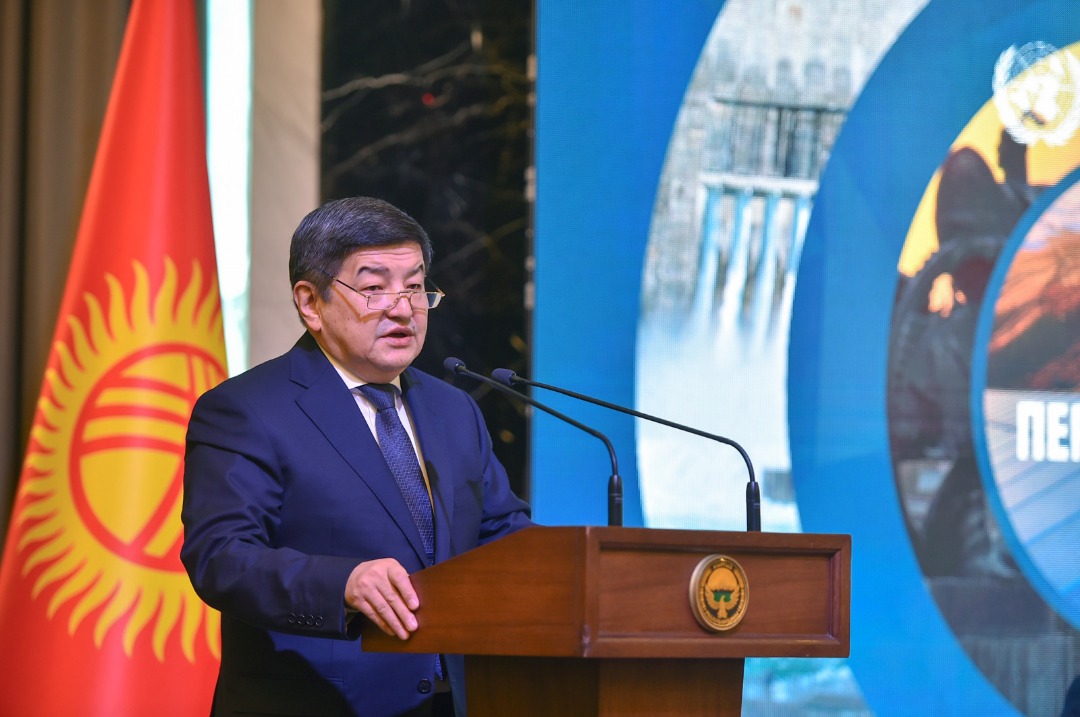
“We must launch hundreds of small hydroelectric power plants, solar and wind stations within 2-3 years.” On February 10, the Chairman of the Cabinet of Ministers of the Kyrgyz Republic Akylbek Zhaparov said this during the national forum “The transition of Kyrgyzstan to sustainable energy: barriers and solutions.”
Akylbek Zhaparov noted that along with the launch of the active phase of construction at strategic facilities – the Kambar-Ata and Upper Naryn HPPs, priority should also be given to renewable, sustainable energy sources.
He stressed that the President of the Kyrgyz Republic at the Climate Change Summit in Glasgow formulated the goal of achieving carbon neutrality by 2050, and renewable energy sources will become the locomotive of this carbon-free policy.
“The potential in hydropower is used only by 10%. Also, the territory of our country receives an average of 4.64 billion MWh of radiant energy per year from the sun, or 23.4 kWh per 1 sq. km. m, and the average annual duration of sunshine varies across the territory from 2100 to 2900 hours. This potential is practically not used by us. There are certain opportunities for the development of wind energy, especially in remote areas where the duration of energetically active winds is 5-7 thousand hours with the specific energy of the wind flow up to 2000 kWh per 1 sq. km. m. The development of renewable energy sources in comparison with alternative sources in the form of thermal or nuclear power plants causes much less damage to the environment. This will reduce greenhouse gas emissions, not pollute the air and glaciers, and not create long-term consequences for the environment. It is important that this will improve the trade and payment balance of the country, as this will reduce the import of coal and gas from abroad,” said the head of the Cabinet. In addition, the new Tax Code includes norms to support the green economy and green technologies. The supply of technologies and equipment for wind and solar power plants and small hydroelectric power plants is exempt from VAT. Amendments have been made to the land legislation to exempt compensation for agricultural and forestry losses during the construction of hydroelectric power stations. Buildings, premises and structures that meet energy efficiency requirements are exempt from paying property tax in the amount of 50%.
At present, the Ministry of Energy has issued certificates of subjects of renewable energy sources for the construction of 48 renewable energy facilities on the territory of the republic. Their total capacity will be about 300 megawatts of electricity.
The construction of several small hydroelectric power plants has begun:
“Bala-Saruu” – 25 megawatts in the Talas region
“Ortho Tokoy” – 21 MW in the Naryn region
“Kara-Kol” – 18 megawatts in Jalal-Abad region
The Ministry of Energy initiated and submitted for public discussion the draft Law “On Renewable Energy Sources” in a new edition, which will eliminate barriers to the launch of renewable energy sources.
In particular, it is proposed to eliminate the requirements for capacity quotas, licensing activities for the sale of electricity, holding a tender, renewable energy entities will be exempt from income tax and the grace payback period will be extended to 15 years.
In order to carry out regulatory legal reform in the field of renewable energy development, a working group was formed under the leadership of Deputy Head of the Cabinet of Ministers Aziz Aaliev to inventory the legislative framework.